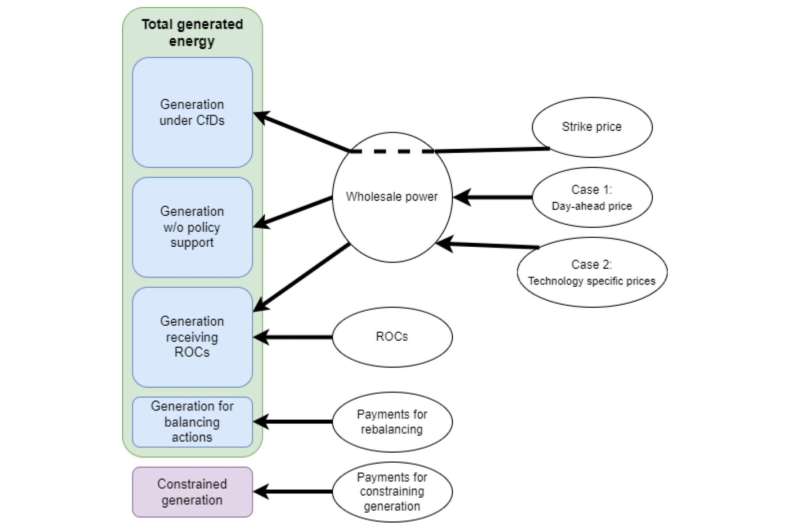This article has been reviewed according to Science X's editorial process and policies. Editors have highlighted the following attributes while ensuring the content's credibility:
fact-checked
trusted source
proofread
Report: UK consumers paid billions more for energy while providers increased revenues

Consumers paid high energy costs while electricity generators saw enormous increases in revenues beyond their costs, finds a new report by UCL researchers that traces the revenues of the UK's electricity generation sector during the 2022 energy crisis.
In the report, "Where does the money go? An analysis of revenues in the GB power sector during the energy crisis," researchers found that electricity consumers in the UK paid £29 billion more in 2022 compared to pre-COVID levels, an increase of about £500 per person. The report draws on publicly available datasets and analyzes the structure of revenues generated by different sources of electricity generation in the UK.
Of the £29 billion revenue increase, about 70% went to natural gas, and renewable energy producers with "renewable obligation credits." The rest went to nuclear, biomass and coal generation. Gas generators tripled their total revenues from about £6 billion in 2018/2019 to £19 billion in 2022. These renewables doubled their total revenue from about £7.7 billion in 2018/2019 to £15.5 billion in 2022.
Lead author Professor Michael Grubb (UCL Institute for Sustainable Resources) said, "The exploding costs to consumers over the last year highlight the need to disentangle the UK's electricity market from the volatile prices of fossil fuels, and to better embrace the cost predictability and stability that renewable energy can provide."
The structure of the UK electricity market means that the cost of electricity is set by the most expensive type of generator in order to meet demand, but this means higher costs for consumers. The war in Ukraine increased the wholesale costs of gas, pushing up electricity costs for both fossil-fuel generated electricity and renewables.
The report authors caution that because of the confidentiality and range of energy contracts, precise figures on profit margins in the electricity market can't be calculated from the market data and estimates are based on representative average contract structures. However, because these renewables didn't experience significant increases in production costs during this time, much of their additional revenues likely translated to much wider profit margins.
These increased profits prompted the Government to introduce the Electricity Generator Levy starting on 1 January 2023, sometimes referred to as a "windfall tax." Had the levy been in place during 2022, it would have reduced revenues to renewable generators by about 12% to 15%, though that likely would not have lowered costs for consumers unless that captured revenue were used as a direct subsidy for consumers.
While much of the increasing price of gas-generated electricity was caused by the rising wholesale cost of natural gas, the report provides evidence that gas producers increased their profit margins as well. By analyzing the "spark spread," a published direct measure of the margins earned by gas generators, and other indicators, the researchers conclude that producers raised the price of electricity significantly more than the increased cost of their gas inputs.
Various changes since 2020 that limited Britain's ability to access lower-cost electricity from mainland Europe contributed to making this possible. The volatility in markets, construction hurdles and long lead times means that there is little price competition between gas and renewable generation, so high gas prices do little to stimulate additional, timely renewables investment.
The new report builds on previous work released last year analyzing how natural gas costs set the price for electricity in the UK, despite cheaper renewables producing much of the country's power.
More information: Report: Where does the money go? An analysis of revenues in the GB power sector during the energy crisis
Provided by University College London





















